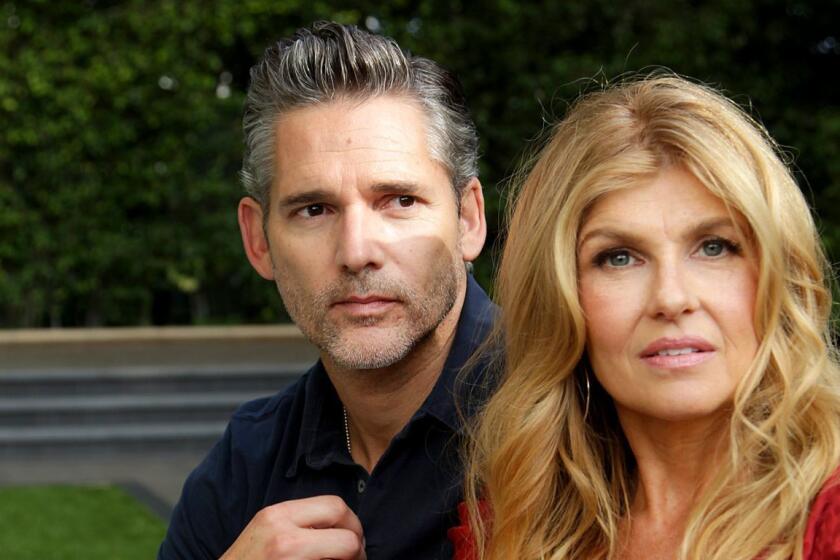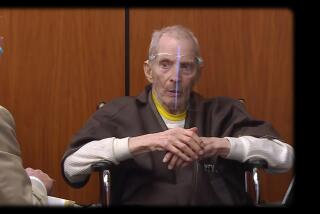How the ‘Dr. Death’ TV show takes ‘a deeper dive’ than the popular podcast
The following contains spoilers from Peacock’s “Dr. Death.”
Having an incompetent surgeon sounds like a nightmare, right? For 33 patients of Texas neurosurgeon Christopher Duntsch, it was a reality. Nicknamed “Dr. Death,” the story of Duntsch’s egregious medical crimes — and the healthcare system that failed so many by allowing him to practice — received the podcast treatment in 2018 from Wondery, the team behind “Dirty John.” Premiering Thursday on Peacock, the television adaptation features “The Affair’s” Joshua Jackson as the charming yet sinister Duntsch.
“In doing a television version of [‘Dr. Death’], we actually had the time and the opportunity to do a bit of a deeper dive into the story than the podcast was able to,” says showrunner Patrick Macmanus.
When asked to describe how she felt when she learned that Bravo was interested in adapting “Dirty John” into a scripted series, Debra Newell delicately offers just one word: “Nervous.”
How is the series different from the podcast?
Beyond the podcast and the case’s key players — orthopedic surgeon Dr. Robert Henderson (played by Alec Baldwin), vascular surgeon Dr. Randall Kirby (Christian Slater) and Asst. Dist. Atty. Michelle Shughart (AnnaSophia Robb), who prosecuted Duntsch in 2017 — Macmanus had access to thousands of pages of research and hundreds of pages of court documents and interviews that allowed him to explore Duntsch’s life, while taking some creative liberties.
Some of the changes for the Peacock series — such as the names of the patients in the podcast who were harmed by Duntsch — were relatively minor. Others were more substantive:
The series’ final episode puts Duntsch on trial for gross malpractice — specifically the mangled spine surgery of Madeline Beyer (Maryann Plunkett) — and features a montage of victim statements about the effects of Duntsch’s “work.”
“There were a lot of interviews that the public were not privy to both on [podcast host and reporter] Laura Beil’s side [and] just in depositions and all the things leading up to trial, where we took the best of all of these people and put them into [different characters],” Macmanus says of the composites who deliver the testimony.
Macmanus and the writers team created several other composites in the series, including Kayla, a former paramour of Duntsch, and Chris, a fellow college football player and onetime friend.
And while the ex-girlfriend of Jerry Summers (Dominic Burgess) — Duntsch’s former classmate, friend and co-worker — played a significant role in the podcast, Macmanus omitted their relationship from the TV show. “What we landed on was we would rather spend the acreage on building up Jerry and Chris’ love story,” says Macmanus. “Totally platonic, but there was a love story there.”
The biggest change Macmanus made in his adaptation comes in the fourth episode, “An Occurrence at Randall Kirby’s Sink.” In reality, Kirby and Duntsch crossed paths, but Henderson and the doctor never did. Macmanus knew it “would be problematic that Alec and Josh were never going to be able to be on-screen together,” so he invented a dream-like sequence where Henderson and Duntsch have a heated encounter.
“We take a dive into Henderson’s subconscious and his conscience during that episode, which allows us to bring Henderson and Duntsch together in a way that never happened,” says Macmanus. “So while it is a diversion from the rest of the feel of the series, it was a very purposeful diversion. And I think it’s an interesting turn that enables Henderson and Duntsch to go toe-to-toe for a little bit.”
In creating the scene, Macmanus was inspired by “Breaking Bad” creator Vince Gilligan’s work. “What I love about ‘Breaking Bad,’ what I love about ‘Better Call Saul,’ is the fact that he takes big creative swings all the time,” the showrunner adds. “You come to expect the unexpected.”
What happens in the last episode?
Spearheaded by Shughart, Duntsch is forced to hear testimonies from his victims, including Summers, who is left paralyzed after being operated on by the doctor. Additionally, Duntsch is confronted on the stand by Henderson and Kirby, who worked for years to stop “Dr. Death” from performing surgery.
At the same time, impassioned defense attorney Robbie McClung (Carrie Preston) attempts to place the blame on the healthcare system as a whole to prevent Duntsch from being convicted. Henderson, in particular, delivers affecting testimony that implicates not only Duntsch but also the healthcare system’s systemic failure to protect the people it serves.
By the end of the episode, the jury is out and the series shows Duntsch hauled off to prison. It’s then revealed to viewers that in 2017, Duntsch was sentenced to life in prison after being found guilty of injury to an elderly person. He’ll be eligible for parole in 2045.
The funniest TV show of the year, about a ‘90s girl group fashioning a comeback, also has some real bops. “Quit flying planes at my heart,” lol.
Does the show explain Christopher Duntsch’s motive behind maiming and killing patients?
In the podcast version of “Dr. Death,” Beil says there’s no clear answer as to why Duntsch continued to operate. There are a few theories. One is that his God complex took over his ability to be rational. The other that it was nature versus nurture: that while it was ingrained in him to act as he did, his environment also fueled his behavior. Then, there’s the suspicion that he was a narcissistic sociopath — or a psychopath. Perhaps it was a combination of all three, as the podcast suggests.
In the series, Macmanus has Jackson lean into Duntsch’s God complex and charming, sociopathic ways. The showrunner believes that the ex-neurosurgeon is the only one who could explain his actions, but after spending three years entrenched in the world of Duntsch, he has his own theories. “I firmly, fundamentally believe that he was a product of nature, nurture and the system that enabled him in terms of nature,” says Macmanus. “Beyond a shadow of a doubt, he was a narcissistic sociopath who had a great deal of natural talents.”
Macmanus believes that if Duntsch would have stayed on the path of research, instead of performing surgery, the public would be speaking about him differently today. “Instead, that nature, the narcissistic sociopath, was nurtured, I believe, by his upbringing, which sort of fanned the flames of that need to be the best at whatever he does via football or wrestling or research and surgery,” he adds. Ultimately, Macmanus believes Duntsch felt he was “infallible.” “If you ask me, ‘Do I believe that he was purposely maiming and murdering people?’ No, I do not,” Macmanus says. “Now, the caveat is that the man deserves to be in jail for the rest of his life.”
More to Read
The complete guide to home viewing
Get Screen Gab for everything about the TV shows and streaming movies everyone’s talking about.
You may occasionally receive promotional content from the Los Angeles Times.







